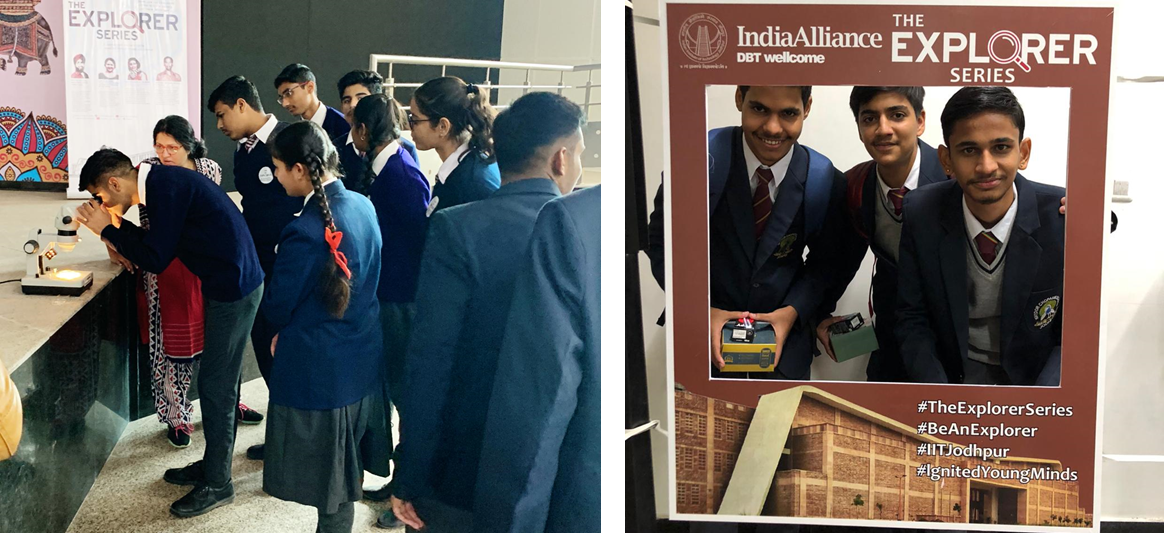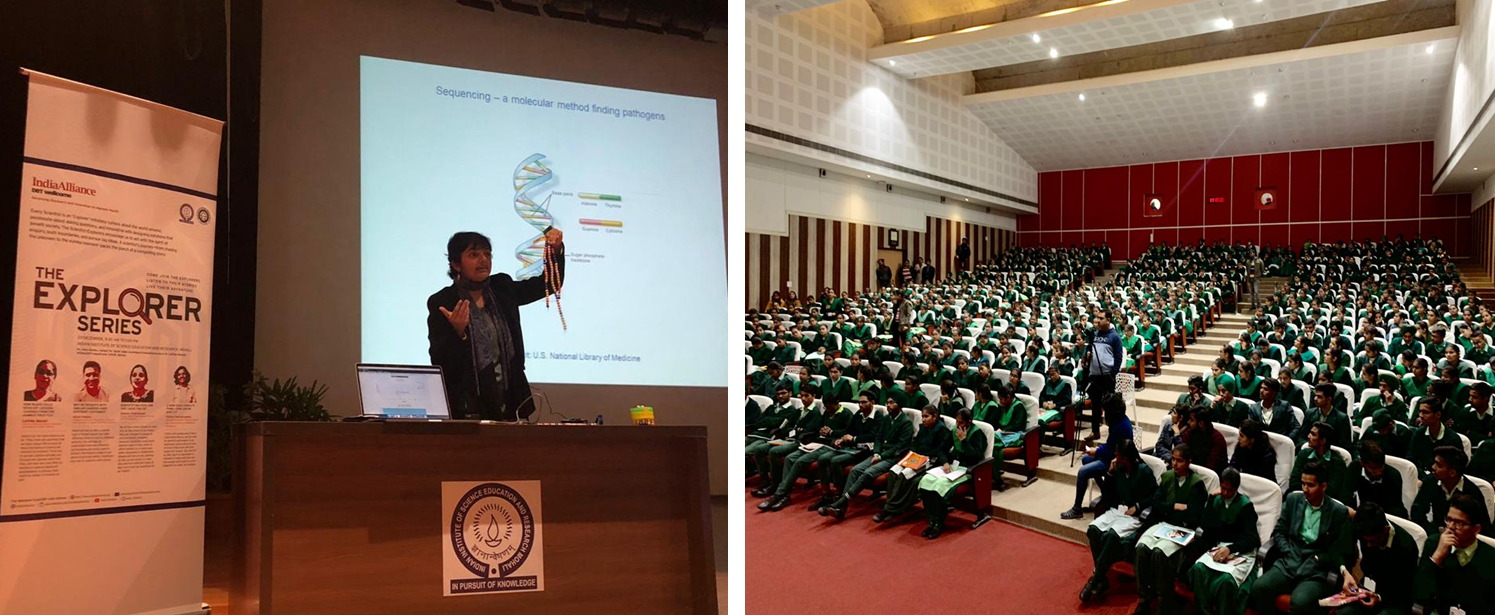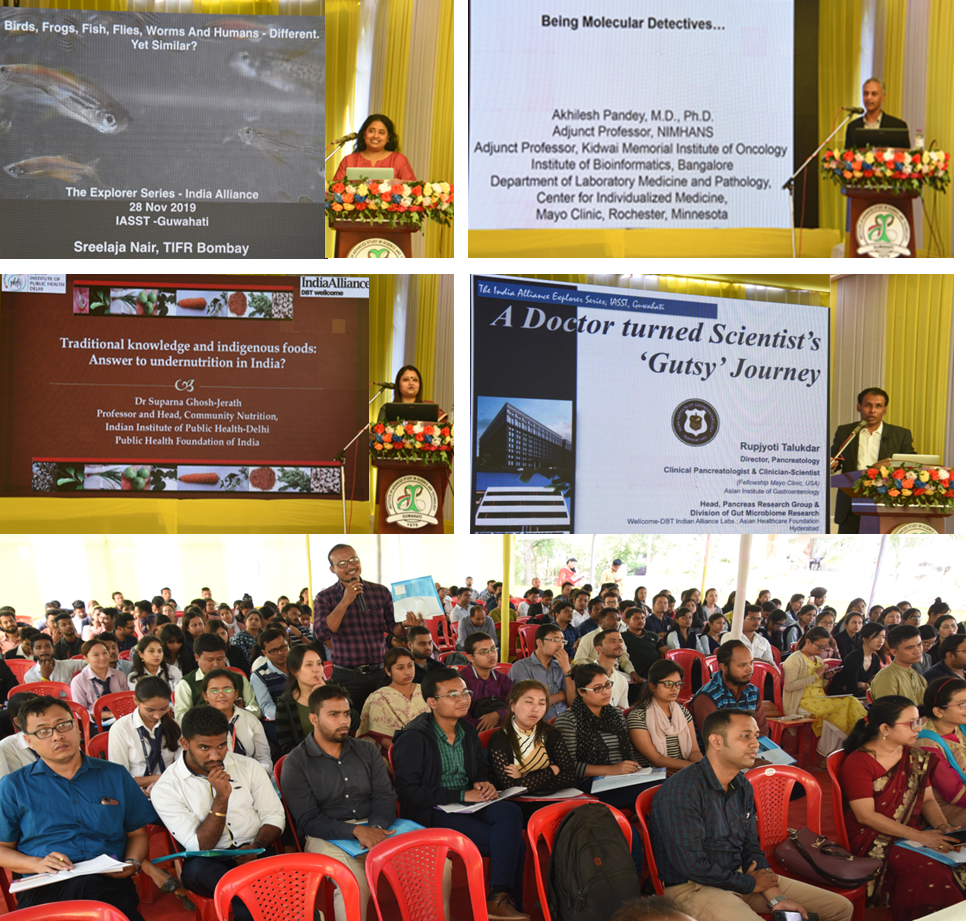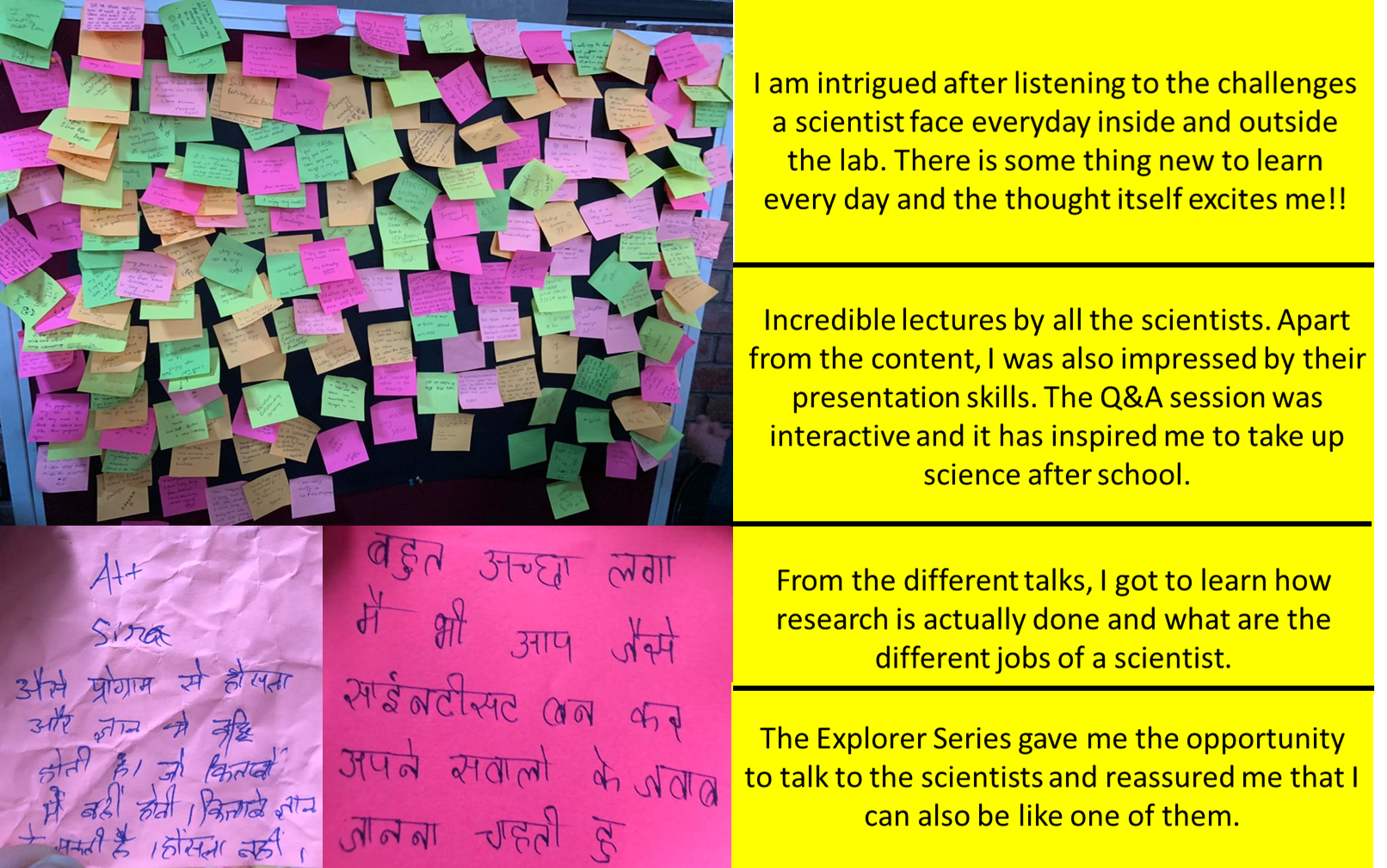 Students looking at different worms through the microscope, the Explorer Series at IIT, Jodhpur
Students looking at different worms through the microscope, the Explorer Series at IIT, Jodhpur
Tips & Tools for Engaging Young People
Introduction
The word ‘Explorer’ is generally used for astronauts or wildlife scientists. But in our view, anyone in search of the unknown is an Explorer. Every new land discovered, every eureka moment starts by asking – why, what if and how?
One of the foremost scientific intellects of all time, Isaac Newton, on his walk through an orchard, is said to have wondered on seeing an apple fall from a tree “if the apple falls, why the does the moon not fall?” and went on to introduce the concept of gravity. Charles Darwin, another iconic figure in science, was curious about the diversity of life – why so many species, why are they only slightly different from each other, how do organisms adapt to their environment so easily? Setting on his voyage to Galápagos islands with these questions resulted in the foundational concepts in science that today we know as the theory of evolution.
Nobel Laureate, CV Raman, during a voyage back to India from England in 1920, observed the wonderful blue opalescence of the Mediterranean Sea using a pocket-sized spectroscope which furthered his investigation into scattering of light in different mediums, a phenomenon eponymously named Raman Effect. It was chemist Asima Chatterjee’s life-long fascination with the medicinal plants of India that led to her discovering that compounds from the Periwinkle plant could be used in cancer treatment. She was the first woman to receive a Doctorate of Science from an Indian university and her tireless investigations led to ground-breaking contributions to medicine.
The process through which knowledge is generated - the scientific method - involves forming a hypothesis, experimentation, data collection, analysis and communication. But it starts with asking a question. Some of the best inventions and innovations that had profound impact on society have come from people who were curious and asked the right questions at the right time. The commonality in America’s three most valuable brands: Apple, Google and Microsoft, is the ability to anticipate market needs and invent unique ways to create and meet demands. All their innovations told the world what it wanted before the world even knew. This shows that the art of thinking and asking questions extends beyond the rigid boundaries of science; to raise a new question, a new possibility is a basic human quality that has enabled us to adapt and survive in harshest of situations.
A scientist looking down a microscope, engaging with communities in remote areas, poring through health data to find patterns, tracking wildlife, are seeking answers to the most fundamental questions that underpin our lives and the planet we reside in. Even though the idea of science has unfortunately been restricted to a lab, the process of building scientific temperament, a spirit of enquiry, is all pervasive and begins much before that.
To help school and college students appreciate the importance of asking questions, a critical aspect of doing science, and to expose them to the life of science and that of scientist, the DBT/Wellcome Trust India Alliance (India Alliance) launched The Explorer Series in late 2018. This series will move to different cities in the country and is designed to inspire the young minds and expose them to the excitement and value of science. In the same spirit, the program hopes to enable the participating scientists to receive new perspectives on their research through interactions with the young students and in the process develop skills to engage and inspire.
About The Explorer Series
The Explorer Series event includes 4 talks by India Alliance fellows, each for 20 minutes followed by 10 minutes of questions and answers. The participants also get a chance to interact with the speakers after the program. So far, 4 events have been organized in this series in 4 Indian cities.
This series kicked off in November 2018 at the tenth-year celebrations of India Alliance in New Delhi. Four India Alliance fellows, the Scientist-Explorers- Farah Ishtiaq (NCBS, Bengaluru), Abi T. Vanak (ATREE, Bengaluru), S.P. Arun (IISc Bengaluru) and Rashmi Rodrigues (St Johns’ Research Institute, Bengaluru), took around 500 undergraduate students on an adventurous journey to explore neuroscience, ecology, infectious diseases, being studied in different settings - mountains, laboratory, clinic, and grasslands. While ecologists, Farah and Abi inspired the audience with their stories of chasing wildlife to study spread of infectious diseases such as malaria and rabies, Rashmi, a clinician scientist and Arun, a neuroscientist, highlighted the use of technology in medicine and in studying complex brain functions, respectively.
The second event in this series was held in Assam, hosted on the beautifully biodiverse campus of Institute of Advanced Study in Science and Technology, Guwahati in November 2019. In addition to participants from around the state of Assam, the event saw participation of young students from the other seven sister states - Manipur, Meghalaya, Mizoram, Arunachal Pradesh. At this event, India Alliance fellows, Akhilesh Pandey (IBAB, Bengaluru), Suparna Ghosh-Jerath (IIPH Delhi), Rupjyoti Talukdar (AIG, Hyderabad) and Sreelaja Nair (TIFR Mumbai), talked about their research in the areas of cancer, nutrition, gut biology and developmental biology, respectively, and shared stories of their serendipitous discoveries and unpredictable yet enjoyable educational and professional journeys.
The series moved to the state of Punjab - the land of five rivers - in December 2019. At the Indian Institute of Science Education and Research, Mohali, Lolitika Mandal, a fly biologist at IISER Mohali; Nikhil Patkar a cancer researcher at ACTREC Mumbai; Shweta Khandelwal a nutrition scientist at PHFI Gurgaon; and Chitra P, a virologist at NIMHANS, Bengaluru engaged with around 300 school students on a range of topics – why is a humble fruit fly a good model to study formation of blood cells, what role do fats play in our diet, how do viruses affect health and how to detect them, and the application of polymerase chain reaction (PCR) technology in detecting cancer. The questions from the students were as diverse as the topics covered by the speakers. On realising that the students in the audience were more comfortable in Hindi than English, the speakers quickly switched to a language and style that made their talks more accessible and interesting for young students in the audience.
At The Explorer Series in the ‘Blue City of Rajasthan’, Jodhpur, in January 2020, India Alliance Fellows, Tavpritesh Sethi (IIIT Delhi), Kavita Babu (IISc Bengaluru), Geeta Trilok Kumar (Institute of Home Economics, Delhi) and Shankar Manoharan (IIT Jodhpur), shared research questions that they have been passionately pursuing, in diverse areas and settings - ‘why do doctors need intelligent computers; ‘how mother’s womb affects health of a child; ‘how do neurons talk to each other’ and ‘why do we need to study bacteria’. The light microscope brought by Kavita had a long queue of students wanting to see what the micro world under the scope of a scientist might look like. Students who asked the best questions were given a Foldscope as a token of encouragement.
 Explorer Scientist, Chitra P, talking about ‘How viruses affect health and how to detect them?’ and demonstrating DNA sequencing using beads on string model, IISER Mohali.
Explorer Scientist, Chitra P, talking about ‘How viruses affect health and how to detect them?’ and demonstrating DNA sequencing using beads on string model, IISER Mohali.
Lessons Learnt
Even though we had set out with a clear plan to expose young students to a life of science, there were important lessons learnt on the way.
Open the doors to science early
For many school students in India, specially from remote and underserved areas, the idea of science is derived mainly from textbooks. Their exposure to practical science or for that matter, to a career in science comes only after school, when they enter undergraduate programs.
Many school students in their feedback shared that they had never been to a research institute or for that matter met a scientist. ‘Such programs give you confidence and increase your knowledge. Books can only give you knowledge but not confidence’, this feedback from a young girl encourages us to not only continue conducting such programs but also make them more interesting and engaging. Programs such as The Explorer Series, science fairs and regular visits to research institutions, will help students appreciate the value of science early on in their educational journey.
Create a culture of questioning
Why is junk food always so tasty?; what will happen if all the fruit flies disappear from the planet?; Do neurons talk to each other at the speed faster than light? Thought-provoking questions such as these from the young audience at the different The Explorer Series programs, proved that asking good questions doesn’t require a degree in science. To promote rational and free thinking, we need to create a culture of questioning that helps us challenge status quo and find new and better ways of doing things. These questions also got our speakers thinking - who says scientists know it all?
Boundaries of disciplines in education
Considering there is limited exposure to science and scientists in general, guidance on careers in science is even harder to come by for many young students in India. The Explorer Series also provides an opportunity to these students to receive career guidance from the speakers, which also brought to fore fundamental issues in the current system that restricts a student’s ability to pursue an interdisciplinary research career. For example, a question posed to Tavpritesh Sethi, a physician-turned-scientist working on Big data science, by a young participant was “Can we imagine a career like you while being expected to choose between maths and biology in school?”
Humanising Science
“I am intrigued after listening to the challenges a scientist faces everyday inside and outside the lab. There is something new to learn every day and the thought itself excites me.” Through the Explorer Series, we wanted to show the human side of science – that of a scientist. Science is a result of human endeavor, imagination and perseverance. It is prone to error, uncertainty and failures as much as any other human activity. The speakers at the Explorer Series humanized the process of science by openly sharing their personal, educational and professional experiences and how those have shaped them and their science.
Tips and Tools for Engaging Young People
Based on our experience of running this series, we have put together a handy list of tips and tools to help scientists and science communicators effectively engage with young audiences.
- Know your audience - It is important to know the audience to tailor the content of the talk – ‘who, why, and how many’ is the first question on the list; school students versus science undergraduates; students from public schools versus private, their socio-economic background and so on. Their needs, language preference and prior knowledge could vary and should be considered as you prepare your talk
- Connect with your audience - Start your presentation with a humorous observation or an anecdote, piggyback on previous presenter's theme or remark. Physical mirroring or creating an illusion of direct eye contact, always helps in drawing audience’s attention. Share a personal story or experience that your audience can relate to
- Make it interactive - Spot polls and simple surveys can serve as excellent ice-breakers, and can help the presenter understand the current set up, moderate the communication language and tune their vocabulary. Getting your young audience to raise their hands, vote, stand-up, speak to the person next to them, shout out etc. helps in breaking the monotony to make the talk fun and interactive
- Make the talk accessible - One is always tempted to impress the audience with a lot of data and jargon but that always never works. If the presenter wants to have an engaging Q&A at the end of their talk, it is important that they make their talk easy-to-understand and to follow. The talks can be made more engaging and accessible by including a hands-on activity or screening an interesting video and more importantly, speaking in a language that the audience is comfortable in
- Make science relevant and relatable - Relating the topic of your talk to world’s current problems or news, using pop culture references and alarming statistics helps in sustaining audience’s attention
- Focus on emotional engagement - Evoke an emotional response in your audience. As mentioned earlier, the role of a speaker is not only to educate your audience but to also heighten their interest in your research.
- Make the talk more attractive - Use of props, videos, handouts, quizzes make presentations more interesting and exciting for young audiences
- Story-telling - Using analogies or telling stories, drawing from your personal experience, to explain your science or the process of doing research has a better impact. Talking about science doesn’t always have to be about facts and figures. People remember stories!
- Be yourself - Share the lessons you have learned the hard way, share your failures and fears, be open, and be real
- The process of Science and epistemic uncertainties - In addition to being true to yourself, it is important to depict science and its process truthfully. “Will there be another flu outbreak?” “Will there be a cancer drug with no side effects?” Scientists might not always have the complete answers to all the questions as science is a work in progress
- Stick to time - Consider the attention span of your audience and try not exceeding the average attention span of 20 minutes. If you have been given a longer time slot, include activities to engage your audience
- Offer a resource guide - Share either a pocket or virtual guide that audience can take with them; this should include important takeways, reference source and lastly riddle / quiz / comic to sustain audience’s interest
- Evaluate - Evaluation is an important tool that helps you to learn from your experiences and improve your engagement with your audience. Young people generally don’t enjoy filling long feedback forms. Use sticky notes to solicit their feedback or design a simple and fun before and after quiz to see if there was shift in knowledge. It will also tell you if a certain engagement tool or communication strategy works better
Find videos from this series HERE
Contact Sarah Iqbal to find out more
This work is licensed under a Creative Commons Attribution 4.0 International License




Please Sign in (or Register) to view further.